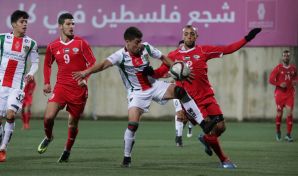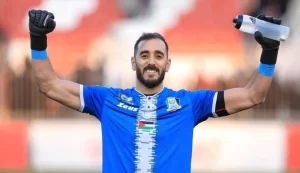
Palestine’s national team played a somewhat impromptu friendly against CD Palestino earlier this month and when the dust settled Al-Fida’i emerged comfortable 3-0 winners.
Here are three quick takeaways from the national team’s win…
The Barakat Effect
It’s undeniable that who leads the team is going to have an impact on gameplay and tactics. Abdel Nasser Barakat was a little maligned for cautious displays in qualifying but those tactics allowed Palestine to stay alive in qualifying until the final month of proceedings.
For all his shortcomings when Barakat goes conservative he doesn’t go full on conservative. We saw a fully regressive approach in last month’s friendlies versus Lebanon and Morocco when Noureddine Ould Ali was in charge and it was ugly.
Following November’s friendlies, multiple national team players reached out to me and expressed frustration with the tactics used. Although no one wants to see discord in the national team squad it was good to hear that players have the confidence in themselves to take the game to an opponent.
Barakat and the national team’s approach to the Palestino game was refreshing; players played with a new found sense of freedom and the results were emphatic. Changes were far from radical- the back line was pushed further up the pitch which created a positive knock-on effect throughout the entire team.
With less of a gap between midfield and defence, Mohammed Darweesh was more adept at doing his job. Mohammed Saleh who had a much maligned debut and sophomore appearances was quietly competent. In attack everything went to plan- Palestine were able to overload the wings of Palestino’s 3-4-3 formation, score nearly at will, and neutralize Palestino’s threat in front of goal.
Homegrown Talent
For the first time in a very long time, Palestine fielded a starting lineup and contingent of substitutes that were born in Palestine and play domestically. Visible progress is taking hold eight years on from consistent league play in the country and the WBPL can lay claim to some very promising talents. An initial generation featuring the likes of Ramzi Saleh, Abedlatif Bahdari, Ashraf Nu’man, and to a lesser extent Khader Yousef has slowly begun to give way to a new generation who could soon make their moves abroad.
Islam Batran is the first of that class to move and is holding his own in Egypt in a talented Wadi Degla side. Abdallah Jaber was close to joining him in Egypt and despite the snag that held up his move could be on his way to greener pastures. Next in line should be Tamer Seyam who quietly had himself a very nice 2016 for both club and country. Don’t rule out moves for national team stalwarts Mohammed Darweesh and Ahmad Abu Nahyeh who have consistently produced the goods for the national team during qualifying.
Competition heats up
The push for places is definitely on in this squad. Perhaps the biggest downfall of previous iterations of the national team was the lack of depth. The absence of one player could alter the performance of the entire team. If Bahdari and Dheeb were present the defence was going to be solid, if one of them was missing it was a mystery as to how the team would preform, and if both were out it was a disaster waiting to happen.
In attack, the team was completely different with and without Ashraf Nu’man.
While depth at centerback is an issue yet to be solved. There are now numerous options throughout the team.
Rami Hamadi could wrestle the #1 shirt from Toufic Ali in 2017. The right back spot that was a sole proprietorship of Alexis Norambuena is now more of a joint venture. The emergence of Mohammed Yameen might result in Pablo Tamburrini seeing time on the bench.
In attack there is no shortage of options. Tamer Seyam took the game by the scruff of the neck against Palestino, setting up two goals and creating a plethora of chances. With Jonathan Cantillana’s club situation up in the air, Seyam might have done enough to warrant consideration as a starter.
The return of Ashraf Nu’man from his brief international retirement gives the national team a player who can change the game on his own. His free kick to put Palestine up 2-0 was nothing short of world class and on his day he is one of the best players on the Asian continent.
Of course there’s the dilemma of who to start up top. A new season in Malaysia will see Matías Jadue and Yashir Pinto Islame duke it out in the country’s top tier. Carlos Salom will be playing in Copa Libertadores come 2017 and Mahmoud Eid, going into his first full season in the Allsvenskan, represents Palestine’s best hope at seeing a national team player in one of Europe’s top leagues. Domestic options in the form Ahmad Abu Nahyeh and Hamada Mar’aba should give Barakat the confidence to loosen the reins and let the team attack with purpose in 2019 AFC Asian Cup qualifying.




